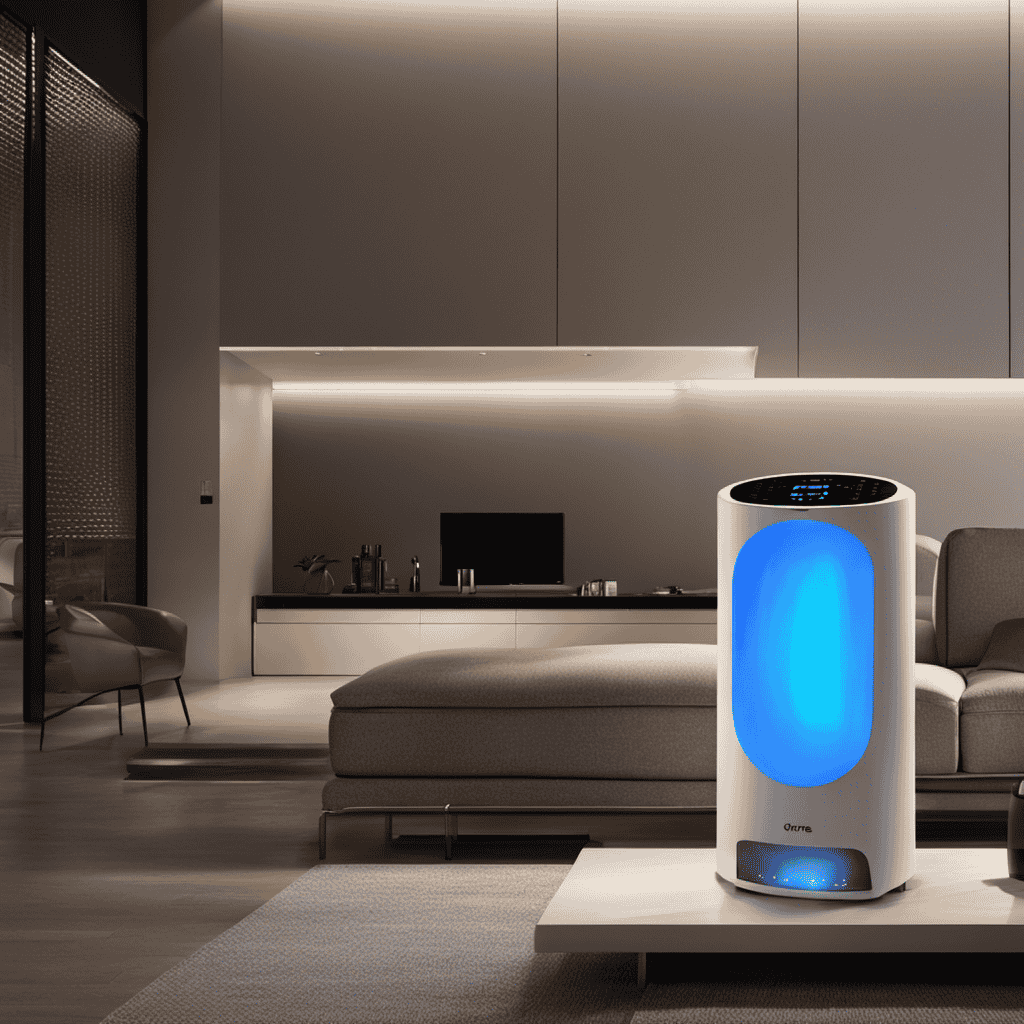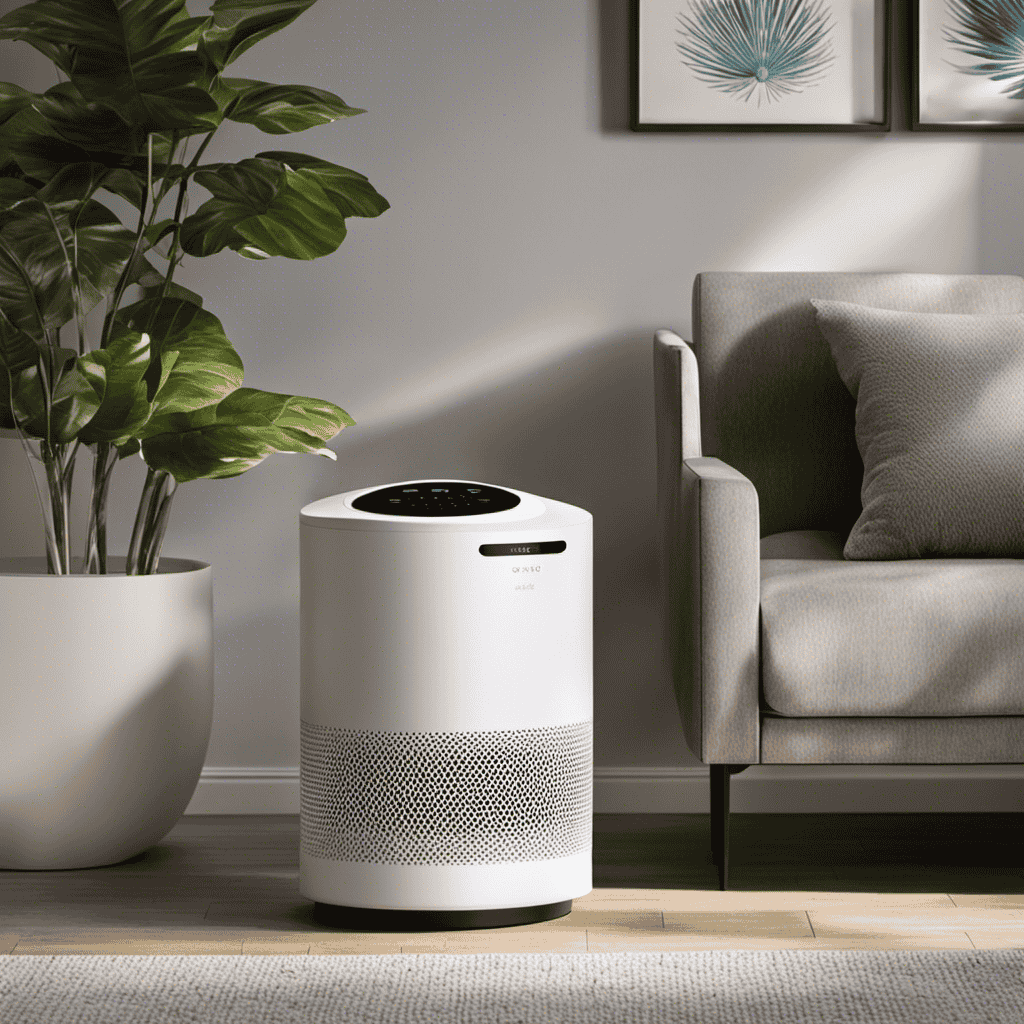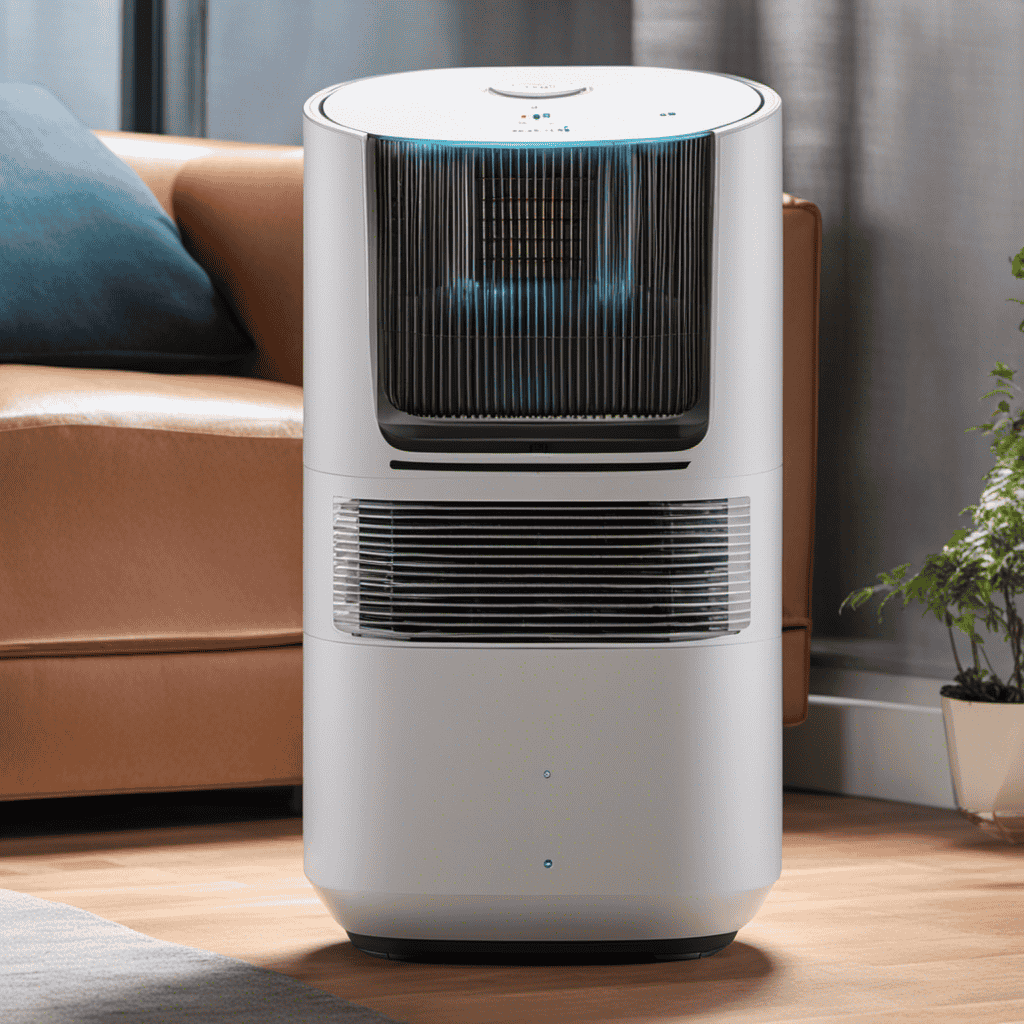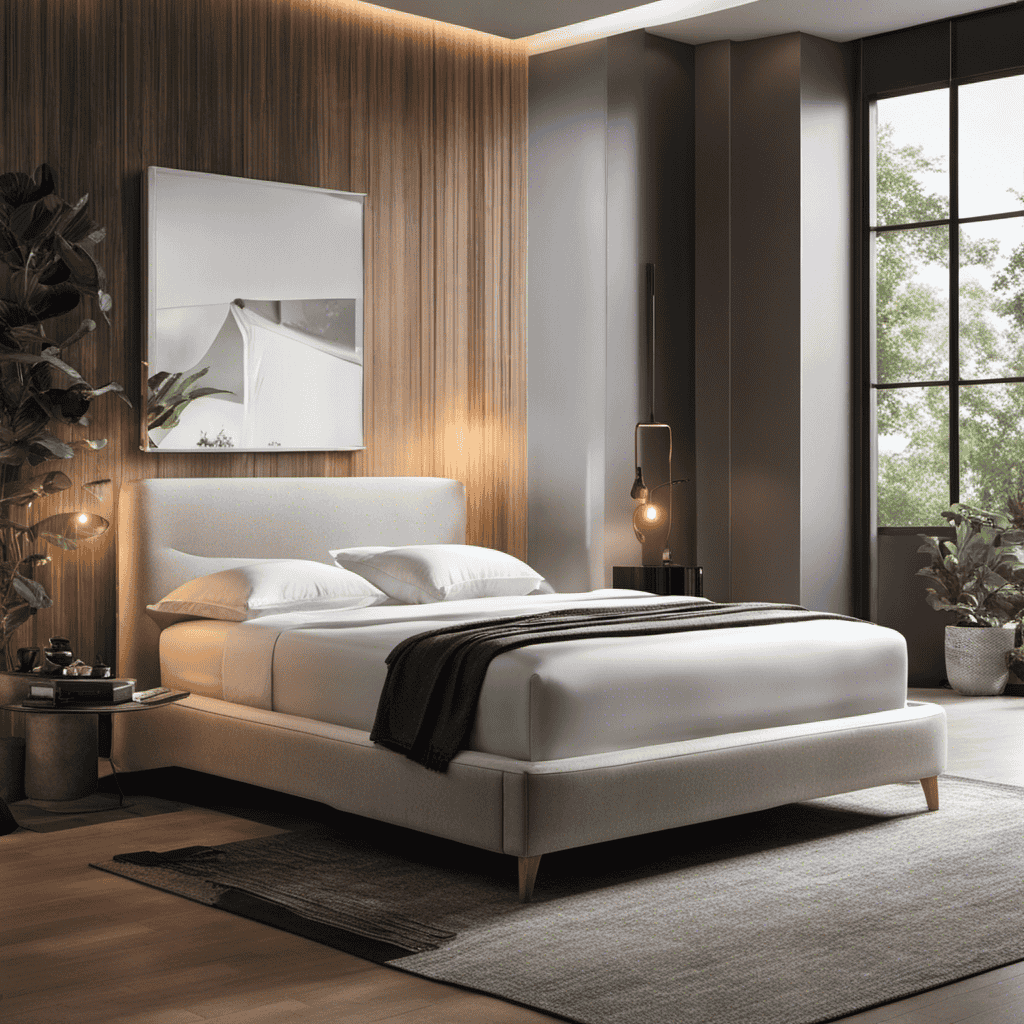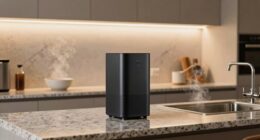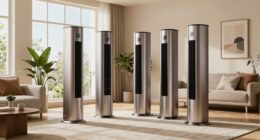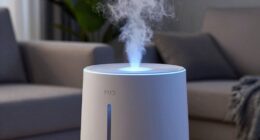I have always been intrigued by the benefits of using an ozone air purifier. It is as if you have a small superhero in your home, battling unseen enemies that can harm the quality of your air.
But how exactly does it work? In this article, we’ll delve into the science behind ozone air purifiers, explore their benefits, and debunk common misconceptions.
Whether you’re concerned about mold prevention or pet dander removal, we’ll cover it all.
So, buckle up and let’s embark on this enlightening journey into the world of ozone air purifiers.
Key Takeaways
- Ozone air purifiers release ozone molecules into the air to react with and neutralize pollutants.
- Ozone air purifiers are effective in large spaces and commonly used in commercial settings like hospitals and offices.
- Ozone air purifiers can effectively eliminate odors and kill certain bacteria and viruses.
- However, ozone air purifiers can have potential side effects on human health and careful selection and use are essential for respiratory health.
How Does an Ozone Air Purifier Work
An ozone air purifier works by releasing ozone molecules into the air, which then react with pollutants and neutralize them. This technology is based on the principle that ozone has the ability to break down and eliminate harmful substances such as bacteria, viruses, mold, and odors.
Ozone molecules are highly reactive and can oxidize pollutants, rendering them harmless. Ozone air purifiers are designed to be effective in large spaces and are often used in commercial settings such as hospitals and offices.
To ensure optimal performance, regular maintenance is crucial. This includes cleaning or replacing filters, checking ozone levels, and ensuring proper ventilation.
Benefits of Using an Ozone Air Purifier
When it comes to choosing between ozone air purifiers and filtered purifiers, it is crucial to consider the health effects of ozone.
Ozone air purifiers work by emitting ozone, which can react with pollutants and eliminate them from the air. However, high levels of ozone can be harmful to human health and may cause respiratory issues.
Ozone Vs. Filtered Purifiers
If you want to compare ozone air purifiers to filtered purifiers, you should consider their effectiveness and potential side effects.
Ozone air purifiers are often compared to UV purifiers and ionizing purifiers. Ozone air purifiers work by producing ozone, a reactive form of oxygen, which can effectively eliminate odors and kill certain bacteria and viruses. However, ozone can also be harmful to humans and pets if inhaled in high concentrations, leading to respiratory issues and other health problems.
On the other hand, filtered purifiers use various types of filters, such as HEPA filters, to trap and remove airborne particles like dust, pollen, and pet dander. Filtered purifiers are generally considered safe and effective, without the potential side effects associated with ozone air purifiers.
When choosing between ozone air purifiers and filtered purifiers, it is important to weigh their effectiveness in removing pollutants against the potential risks they pose to your health.
Health Effects of Ozone
The potential risks of inhaling high concentrations of ozone include respiratory issues and other health problems. Ozone, a gas composed of three oxygen atoms, can be harmful when inhaled in large quantities. When it comes to ozone air purifiers, it is important to consider the potential health effects. Here are some key points to keep in mind:
-
Ozone can irritate and inflame the respiratory system, causing symptoms such as coughing, wheezing, and shortness of breath.
-
Prolonged exposure to high levels of ozone can lead to lung damage and worsen pre-existing respiratory conditions, such as asthma or chronic obstructive pulmonary disease (COPD).
-
Ozone air purifiers can produce ozone as a byproduct, which can contribute to indoor ozone pollution.
-
The Environmental Protection Agency (EPA) has set a limit for ozone exposure, and levels above this limit can be harmful to human health.
-
It is essential to carefully choose and use ozone air purifiers to minimize the risk of inhaling high concentrations of ozone and protect our respiratory health.
Common Misconceptions About Ozone Air Purifiers
One common misconception about ozone air purifiers is that they are completely safe for indoor use. While it is true that ozone air purifiers can effectively remove odors and kill bacteria, there are several myths surrounding their safety that need to be debunked. To provide a clear picture, let’s examine the following table:
| Myth | Fact |
|---|---|
| Ozone air purifiers are | Ozone air purifiers |
| completely safe for | can produce harmful |
| indoor use. | ozone levels. |
| ————————— | —————————- |
| Ozone air purifiers | Ozone can cause |
| are effective in removing | respiratory irritation, |
| allergens and pollutants. | coughing, and shortness |
| of breath. | |
| ————————— | —————————- |
| Ozone air purifiers | Ozone generators are |
| are the same as ozone | different from ozone air |
| generators. | purifiers. |
| ————————— | —————————- |
As shown in the table, ozone air purifiers can produce harmful ozone levels and may cause respiratory irritation. It is important to understand that ozone air purifiers are different from ozone generators. Transitioning into the next section, let’s explore the differences between ozone air purifiers and traditional air purifiers.
Ozone Air Purifier Vs. Traditional Air Purifier: What’s the Difference
To understand the difference, let’s compare how a traditional air purifier and an ozone air purifier work.
-
Traditional air purifiers use filters to trap particles and pollutants in the air.
-
Ozone air purifiers produce ozone gas, which reacts with and neutralizes odors and pollutants.
-
Cost comparison: Traditional air purifiers typically require filter replacements, which can add to the overall cost. Ozone air purifiers do not require filters, resulting in potential long-term cost savings.
-
Ozone air purifiers for cars and vehicles: Ozone air purifiers can be used in vehicles to eliminate odors and improve air quality. They are compact and portable, making them convenient for use on the go.
-
It’s important to note that ozone air purifiers can produce ozone gas, which can be harmful if not used properly. It is recommended to follow manufacturer guidelines and use ozone air purifiers in well-ventilated areas.
Understanding Ozone Generation in Air Purifiers
When considering the use of ozone air purifiers, it’s important to understand the potential health risks associated with ozone exposure. Ozone, a reactive gas, can cause respiratory issues and worsen existing conditions such as asthma.
It’s crucial to compare ozone air purifiers with HEPA filters. HEPA filters are known for their efficiency in removing airborne particles without the release of ozone gas.
Ozone Health Risks
There’s a significant concern about the health risks associated with ozone air purifiers. While these devices are designed to remove pollutants from the air, they also produce ozone as a byproduct, which can have detrimental effects on our health.
Here are some important points to consider:
- Ozone air purifier side effects can include respiratory irritation, coughing, and wheezing.
- Prolonged exposure to elevated levels of ozone can lead to lung inflammation and damage.
- Ozone can react with other chemicals in the air, forming harmful byproducts such as formaldehyde.
- Long-term effects of ozone exposure may include increased risk of respiratory diseases, such as asthma and chronic obstructive pulmonary disease (COPD).
- Ozone can also exacerbate existing respiratory conditions and worsen symptoms.
It is crucial to weigh the potential benefits of air purification against the risks associated with ozone exposure. Consulting with a healthcare professional is advised before using ozone air purifiers, especially for individuals with respiratory conditions or sensitivities.
Ozone Vs. HEPA Filters?
Now that we have discussed the potential health risks associated with ozone air purifiers, let’s compare them to HEPA filters in terms of safety and effectiveness.
Ozone air purifiers work by generating ozone, a molecule that can eliminate odors and kill bacteria. However, they can also produce harmful levels of ozone, especially in poorly ventilated spaces. This raises concerns about their safety.
On the other hand, HEPA filters are mechanical filters that trap particles as small as 0.3 microns, including dust, pollen, and pet dander. They do not produce any harmful byproducts and are considered safe to use.
In terms of effectiveness, ozone air purifiers may be more effective at neutralizing odors, but HEPA filters are generally more efficient at removing airborne particles.
Therefore, when considering both safety and effectiveness, HEPA filters are often the preferred choice for air purification.
The Role of Ozone in Eliminating Airborne Pollutants
Ozone air purifiers can effectively eliminate airborne pollutants. Many people are unaware of the benefits of using ozone air purifiers and have misconceptions about their effectiveness. Here are some key points to consider:
-
Ozone air purifiers use ozone, a highly reactive form of oxygen, to neutralize and eliminate pollutants in the air.
-
Ozone is a powerful oxidant that can break down harmful chemicals, odors, and volatile organic compounds (VOCs).
-
Ozone air purifiers can kill bacteria, viruses, and mold spores, providing a healthier environment.
-
Contrary to popular belief, ozone air purifiers do not solely mask odors but actually remove them by neutralizing the source.
-
It is important to note that ozone air purifiers should be used in unoccupied spaces as high levels of ozone can be harmful to humans and pets.
Can Ozone Air Purifiers Remove Odors
When it comes to odor elimination effectiveness, it is important to consider the effectiveness of ozone air purifiers.
While ozone can indeed remove odors, there are also safety concerns associated with its use.
Therefore, it is essential to explore alternative odor removal methods that are both effective and safe.
Odor Elimination Effectiveness
You can really notice the effectiveness of odor elimination with an ozone air purifier. Ozone air purifiers are highly efficient in removing odors from the air. Here are some key reasons why ozone air purifiers are so effective:
-
Ozone molecules are highly reactive and can break down and neutralize odor-causing particles in the air.
-
Ozone can penetrate porous materials, such as carpets and fabrics, to eliminate trapped odors.
-
Ozone has a long-lasting effect, continuing to eliminate odors even after the purifier is turned off.
-
Ozone air purifiers can cover large areas, ensuring that odors are effectively eliminated throughout the space.
-
Ozone air purifiers are easy to use and require minimal maintenance.
With these factors combined, ozone air purifiers provide an efficient and effective solution for odor removal in various environments.
Safety Concerns With Ozone
One of the main safety concerns with using an ozone air purifier is the potential for ozone to irritate the respiratory system. Ozone, a highly reactive gas, can cause coughing, shortness of breath, and throat irritation when inhaled. This is why ozone air purifier regulations have been put in place to ensure the safety of consumers.
The Environmental Protection Agency (EPA) has set a limit of 0.05 parts per million (ppm) for ozone emissions from indoor air purifiers. It is important to check if the air purifier you are considering meets these regulations to avoid any potential health risks.
If you are concerned about the safety of ozone air purifiers, there are alternative options available. HEPA air purifiers, for example, are highly effective in removing airborne particles without producing ozone. These alternatives provide a safer and healthier environment for you and your family.
Alternative Odor Removal Methods?
If you’re looking for alternative methods to remove odors, there are options available that don’t involve using ozone air purifiers. While ozone air purifiers are effective at eliminating odors, they can also pose health risks.
Here are some alternative odor removal methods to consider:
- Activated charcoal: Charcoal is highly porous and can absorb odors from the air.
- Baking soda: Placing an open box of baking soda in a room can help absorb and neutralize odors.
- Vinegar: Vinegar is known for its strong odor-fighting properties and can be used to eliminate odors in various areas of the home.
- Essential oils: Certain essential oils have natural deodorizing properties and can be diffused or mixed with water to create a homemade air freshener.
- Fresh air and ventilation: Opening windows and allowing fresh air to circulate can help remove odors and improve indoor air quality.
These alternative methods can be just as effective as ozone air purifiers in eliminating odors, without the potential risks associated with ozone exposure.
Safety Concerns and Precautions With Ozone Air Purifiers
Be cautious of potential safety concerns when using ozone air purifiers. Ozone, a molecule made up of three oxygen atoms, is a powerful oxidizing agent that can be harmful to human health when present in high concentrations. Indoor ozone levels should always be kept within safe limits as specified by ozone regulations.
Excessive exposure to ozone can cause respiratory issues, throat irritation, and even lung damage. It is important to follow the manufacturer’s instructions and avoid prolonged exposure to ozone generated by air purifiers. Additionally, ozone air purifiers should not be used in occupied spaces and should be kept away from children and pets.
Understanding the potential safety risks associated with ozone air purifiers is crucial to ensure the well-being of individuals using these devices.
Transitioning into the next section, let’s explore whether ozone air purifiers can help alleviate allergies and asthma symptoms.
Ozone Air Purifiers for Allergies and Asthma: Does It Help
Using ozone air purifiers may provide relief for individuals suffering from allergies and asthma. These devices work by releasing ozone into the air, which can effectively remove allergens and irritants that trigger respiratory symptoms.
Here are some key benefits of using ozone air purifiers for asthma and allergies:
-
Reduction of airborne allergens: Ozone air purifiers can help remove common allergens such as pollen, dust mites, and pet dander from the air, reducing the risk of allergic reactions.
-
Elimination of odors: Ozone has a powerful oxidizing effect that can neutralize unpleasant odors caused by mold, smoke, or pets, making the air fresher and cleaner.
-
Disinfection of the air: Ozone is a natural disinfectant that can kill bacteria, viruses, and fungi in the air, reducing the risk of respiratory infections.
-
Improved respiratory health: By removing allergens and irritants from the air, ozone air purifiers can help alleviate symptoms of asthma and allergies, promoting better respiratory health.
-
Compact and portable: Ozone air purifiers come in various sizes and designs, making them easy to use and move around different areas of your home or workplace.
It is important to note that while ozone air purifiers can be beneficial for some individuals with asthma and allergies, they may not be suitable for everyone. It is recommended to consult with a healthcare professional before using ozone air purifiers for respiratory health.
Choosing the Right Ozone Air Purifier for Your Needs
To choose the right ozone air purifier for your needs, consider factors such as room size, filtration system, and noise level.
When it comes to ozone air purifier features, it’s important to look for a model that has adjustable ozone output levels. This allows you to customize the purification process based on the specific needs of your space.
Additionally, look for an ozone air purifier with a reliable and efficient filtration system. HEPA filters are highly recommended as they can capture particles as small as 0.3 microns, including allergens, dust, and pet dander.
Lastly, consider the noise level of the purifier. Some models have a silent mode, which is great for bedrooms or offices.
As for ozone air purifier maintenance, regular cleaning of filters is necessary to ensure optimal performance and longevity of the unit.
Ozone Air Purifiers and Indoor Air Quality
When choosing the right ozone air purifier for your needs, it’s important to consider how it can improve indoor air quality. Ozone air purifiers are known for their ability to remove allergens and volatile organic compounds (VOCs) from the air.
Here are five key benefits of using ozone air purifiers:
-
Allergen Removal: Ozone air purifiers can effectively eliminate common allergens such as dust mites, pet dander, and pollen, providing relief for allergy sufferers.
-
VOC Removal: Ozone air purifiers can also help remove harmful chemicals and VOCs that are released from household products, cleaning agents, and furniture, improving indoor air quality.
-
Odor Elimination: Ozone air purifiers have the ability to neutralize unpleasant odors, leaving the air fresh and clean.
-
Mold and Mildew Control: Ozone air purifiers can inhibit the growth of mold and mildew, preventing their spread and associated health risks.
-
Airborne Bacteria and Viruses: Ozone air purifiers have been found to reduce the presence of airborne bacteria and viruses, promoting a healthier environment.
Ozone Air Purifiers and Mold Prevention
Ozone air purifiers have been a popular choice for improving indoor air quality. However, it is important to understand their impact on allergies and respiratory health.
When it comes to allergies, ozone air purifiers may not be the best option. While they can remove certain allergens from the air, they can also produce ozone as a byproduct. Ozone can irritate the respiratory system, triggering allergies and worsening symptoms in sensitive individuals.
Respiratory health can also be affected by ozone air purifiers. Breathing in high levels of ozone can cause shortness of breath, coughing, and chest tightness. Prolonged exposure to ozone can even lead to lung damage.
To protect your respiratory health, it is recommended to choose air purifiers that do not produce ozone. Look for options that use alternative technologies like HEPA filters, activated carbon, or electrostatic precipitators. These can effectively remove allergens from the air without posing any risk to your respiratory system.
Ozone Air Purifiers and Pet Dander Removal
When it comes to ozone air purifiers and their effectiveness against pet dander removal, it is important to consider the scientific evidence. Ozone has been shown to be effective in reducing airborne allergens, including pet dander, by breaking down the proteins that cause allergic reactions.
However, it is also crucial to address the safety concerns associated with ozone, as high levels of ozone can be harmful to human health, especially for individuals with respiratory conditions.
Ozone Effectiveness Against Dander
To effectively reduce dander in your home, you’ll want to consider the effectiveness of an ozone air purifier. Ozone air purifiers can be beneficial for individuals with allergies or respiratory health issues. Here are some key points to consider:
- Ozone air purifiers use ozone, a highly reactive molecule, to break down and eliminate airborne contaminants.
- Ozone has the ability to neutralize pet dander, pollen, and other allergens by oxidizing their molecular structure.
- By reducing the presence of dander in the air, ozone air purifiers can alleviate allergy symptoms and improve respiratory health.
- Ozone air purifiers are highly effective at removing dander from the air, providing a cleaner and healthier living environment.
- It is important to choose an ozone air purifier with appropriate ozone output levels to ensure optimal performance and safety.
Considering the effectiveness of ozone air purifiers in reducing dander, it is crucial to address the potential safety concerns associated with ozone.
Safety Concerns With Ozone?
It’s important to address the potential safety concerns associated with using ozone air purifiers. Ozone exposure can have harmful effects on human health, especially when breathed in high concentrations.
Ozone is a highly reactive gas that can irritate the respiratory system, leading to coughing, chest discomfort, and shortness of breath. Prolonged exposure to high levels of ozone can also cause lung inflammation and damage.
To protect public health, ozone regulations have been put in place to limit ozone emissions from air purifiers. These regulations set standards for ozone emission levels and require manufacturers to label their products with ozone output information.
It is crucial for consumers to be aware of these regulations and choose air purifiers that meet the safety standards to minimize the potential risks associated with ozone exposure.
Ozone Air Purifiers for Commercial and Industrial Spaces
Ozone air purifiers are commonly used in commercial and industrial spaces. These powerful machines are designed to eliminate airborne contaminants and odors, making the indoor environment healthier and more pleasant for occupants. When it comes to offices, ozone air purifiers provide several benefits:
- Improved air quality: Ozone air purifiers effectively remove pollutants such as dust, bacteria, and allergens, creating a healthier workspace.
- Odor elimination: These purifiers can eliminate unpleasant smells caused by food, cleaning chemicals, or other sources.
- Increased productivity: By providing cleaner air, ozone air purifiers can help reduce sick days and improve overall employee well-being, leading to increased productivity.
- Energy efficiency: Many ozone air purifiers are designed to be energy-efficient, helping to reduce energy consumption and lower operating costs.
- Easy maintenance: Ozone air purifiers for offices are often low-maintenance, requiring minimal upkeep and filter changes.
In warehouses, ozone air purifiers also offer significant advantages:
- Large coverage area: Ozone air purifiers can effectively clean the air in warehouses, where there is a high volume of pollutants due to machinery, vehicles, and other factors.
- Elimination of volatile organic compounds (VOCs): These purifiers can help remove VOCs, which are often present in warehouses due to the storage of chemicals and other materials.
- Improved worker safety: By reducing airborne contaminants, ozone air purifiers contribute to a safer working environment for warehouse employees.
- Reduction in cross-contamination: Ozone air purifiers can help prevent the spread of airborne diseases and contaminants, reducing the risk of cross-contamination in warehouse settings.
- Long lifespan and durability: Ozone air purifiers for warehouses are built to withstand harsh industrial environments, providing reliable performance over an extended period.
Ozone Air Purifiers: Pros and Cons
One of the advantages of ozone air purifiers is their ability to effectively eliminate odors in indoor environments. However, it is important to consider the potential drawbacks of using ozone air purifiers, particularly in terms of their environmental impact and maintenance requirements.
Ozone air purifiers work by releasing ozone gas into the air, which reacts with pollutants and eliminates them. While this can be effective in removing odors, it is important to note that ozone is a known respiratory irritant and can be harmful to humans and animals when present in high concentrations. This raises concerns about the environmental impact of ozone air purifiers, as well as the potential health risks they pose.
Additionally, ozone air purifiers require regular maintenance to ensure their effectiveness. Filters need to be cleaned or replaced regularly, and the ozone-generating components may also need to be serviced. This can add to the cost and effort required to maintain these purifiers.
Frequently Asked Questions
Are Ozone Air Purifiers Safe to Use in Homes?
Ozone air purifiers can be effective for removing odors and killing bacteria, but they can also be harmful to human health. HEPA filters are a safer and more reliable option for improving indoor air quality.
Can Ozone Air Purifiers Effectively Remove Pet Dander From the Air?
Ozone air purifiers are effective at removing pet dander from the air. They work by releasing ozone, which reacts with pollutants and eliminates them. However, it is important to consider safety concerns and potential health risks associated with ozone.
What Are the Potential Health Risks Associated With Using Ozone Air Purifiers?
Potential risks associated with ozone air purifiers include respiratory irritation, chest pain, coughing, and shortness of breath. They can also exacerbate existing respiratory conditions such as asthma and decrease lung function over time.
Are Ozone Air Purifiers Suitable for Use in Commercial and Industrial Spaces?
Ozone air purifiers, huh? Well, let me tell you, commercial and industrial ozone air purifiers are no joke. They’re designed to tackle big spaces, removing pollutants and odors with their powerful ozone-generating technology.
What Are the Disadvantages of Using Ozone Air Purifiers Compared to Traditional Air Purifiers?
The drawbacks and limitations of using ozone air purifiers compared to traditional air purifiers include potential health risks, the production of harmful byproducts, and the limited effectiveness in removing certain pollutants.
Conclusion
After exploring the world of ozone air purifiers, it’s clear that these devices offer unique benefits in terms of air purification. While they may not be suitable for every situation, ozone air purifiers excel at eliminating odors, mold prevention, and pet dander removal.
However, it’s important to understand the potential risks and limitations associated with ozone generation. Like a double-edged sword, ozone air purifiers can be a powerful tool for improving indoor air quality, but they must be used responsibly and in accordance with safety guidelines.
